- News
- Reviews
- Bikes
- Components
- Bar tape & grips
- Bottom brackets
- Brake & gear cables
- Brake & STI levers
- Brake pads & spares
- Brakes
- Cassettes & freewheels
- Chains
- Chainsets & chainrings
- Derailleurs - front
- Derailleurs - rear
- Forks
- Gear levers & shifters
- Groupsets
- Handlebars & extensions
- Headsets
- Hubs
- Inner tubes
- Pedals
- Quick releases & skewers
- Saddles
- Seatposts
- Stems
- Wheels
- Tyres
- Tubeless valves
- Accessories
- Accessories - misc
- Computer mounts
- Bags
- Bar ends
- Bike bags & cases
- Bottle cages
- Bottles
- Cameras
- Car racks
- Child seats
- Computers
- Glasses
- GPS units
- Helmets
- Lights - front
- Lights - rear
- Lights - sets
- Locks
- Mirrors
- Mudguards
- Racks
- Pumps & CO2 inflators
- Puncture kits
- Reflectives
- Smart watches
- Stands and racks
- Trailers
- Clothing
- Health, fitness and nutrition
- Tools and workshop
- Miscellaneous
- Buyers Guides
- Features
- Forum
- Recommends
- Podcast
news
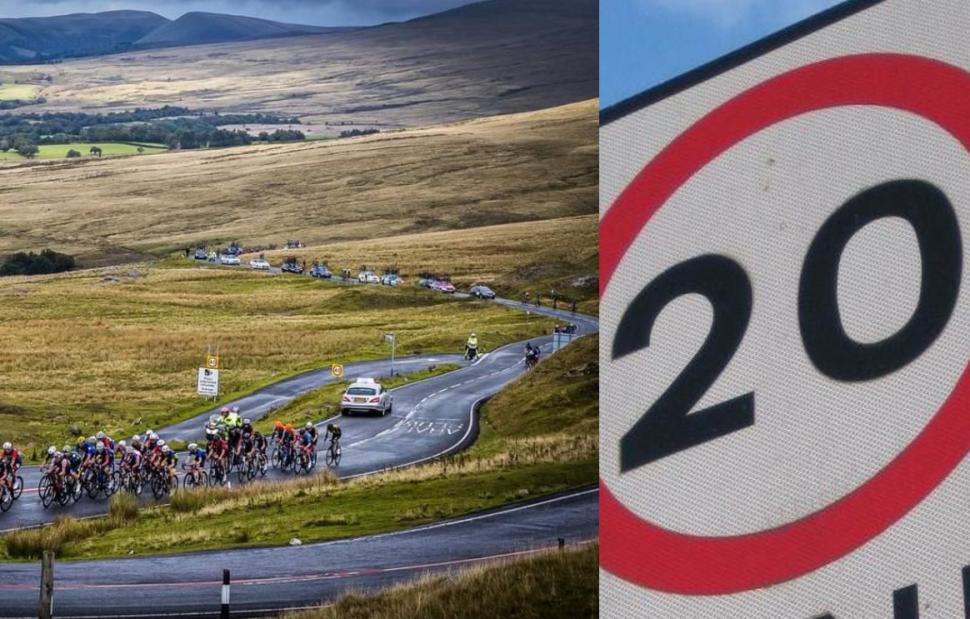 Junior Tour of Wales cycle race rerouted due to 20mph speed limits (Beicio Cymru)
Junior Tour of Wales cycle race rerouted due to 20mph speed limits (Beicio Cymru)Junior Tour of Wales cycle race rerouted due to 20mph speed limits, as local cycling club chair rues “sad state of affairs” that sport is “impacted by short-sighted policy” and governing body admits Welsh road racing is “unsustainable”
Club cyclists in Wales have criticised the “sad state of affairs” that have led to three stages of the Junior Tour of Wales being rerouted and shortened due to the country’s default 20mph speed limit, as the sport’s governing body admitted that several factors, including the introduction of the 20mph limit, have made Welsh road racing “unsustainable”.
While the Welsh government worked with the organisers to ensure the race could go ahead safely, due to seven miles of 20mph roads featuring on the course, and the event’s late registration, three of the Junior Tour’s five stages have been modified as support vehicles would not have been able to keep up during those sections without breaking the speed limit.
The finish of stage four of the race – which takes place over four days and has been won in the past by future pros Tom Pidcock, Dan Martin (ahead of second-place Geraint Thomas), Fred Wright, Alex Dowsett, and Roger Hammond – has also been moved from Nantgaredig, Carmarthenshire, the home of three-time Olympic medallist Emma Finucane, due to the 20mph speed limits.
Tom Pidcock wins the 2017 Junior Tour of Wales (British Cycling)
“A Welsh government scheme designed to enable cycle races to manage race and public safety through 20mph zones has failed, leaving us with a major problem,” organiser Richard Hopkins said of the last-minute alterations ahead of Friday evening’s first stage.
“Even though there was only seven miles of 20mph across the whole 237-mile, four-day race, and even then split into a number of very short sections, we couldn’t guarantee to manage all of them safely.”
> Why the 20mph zone time trial ban could be the “tip of the iceberg” for British racing
He continued: “In the process we've lost a large part of the character and challenge the event is famous for, including our stage finish in Nantgaredig, the home village of Welsh Olympic champion Emma Finucane, as well as the climb of the Black Mountain in Carmarthenshire.
“It’s massively demoralising, after putting so much effort into trying to make the race as a whole viable, and it also leaves me wondering what’s going to happen next, because every time I think we might be in a good place, something else rolls along to knock it back.”
“We now have a safer Wales. But for racing it’s challenging”
While cyclists in the UK do not share the same legal obligation as motorists to stick to speed limits, and cannot be charged with an offence of excess speed, the necessity to ensure the convoy of support vehicles can follow the race safely in these 20mph zones has proven a challenge for organisers and governing bodies in the wake of the introduction of a default 20mph speed limit across Wales last year.
(Beicio Cymru)
In a statement issued this week reflecting on the issues affecting road racing in Wales at the moment, Beicio Cymru (formerly Welsh Cycling) said that the new default speed limit has emerged as one of the factors currently making the sport “unsustainable”.
“Broadly speaking, the default speed is a positive – proven in the reduction in road casualties and insurance claims as a result,” the governing body said. “We now have a safer Wales that over time will help develop the confidence for more people to participate in cycling.
“For racing though, it’s challenging. Beicio Cymru and associates have been trying to resolve the impact on racing for two years, right down to the last minute, but it was not possible. We have asked for Temporary Road Orders to ensure the riders and the convoy can maintain speeds through 20mph sections but have been unable to secure these.
> Do cyclists have to stick to the speed limit?
“Whilst some will recognise that cyclists cannot be prosecuted for speeding, we still have a convoy of vehicles to manage and we also have no benchmark for what happens if an incident happens within a 20mph zone. We make decisions to protect riders, organisers, ourselves and cycling in general. It is not as black and white as just about the limits, especially when 20mph zones are not all the same (i.e. some sections, uphill, the speed limit will not be exceeded and is therefore not an issue, other sections that are downhill may see riders doubling the speed limit).
“However, we have been urging event organisers to plan for this and try and use risk assessed routes that avoid 20mph sections, whilst working through scenarios to manage the convoy.
“Unfortunately, the late registration of the Junior Tour gave little space to properly investigate alternative routes and there have been several moments in the last few weeks where I was sure the tour would be cancelled due to a range of issues – but we finally have five safe, quality stages, albeit different stages than that originally planned.”
(Alex Whitehead/SWpix.com)
However, while the 20mph speed zones have been blamed for the rerouted race, one British race organiser told road.cc that speeding vehicles in the convoy marred stages of the Junior Tour of Wales last year, before the default limit was introduced.
“It’s unfortunate that the event had to change the route and skip some of the classic climbs like the Black Mountain, but from what I’ve observed in previous years, the driving by the team vehicles has been very poor,” Matthew Page told road.cc.
“They were speeding along narrow roads – some without pavements – where parked cars and speed humps are common. I’d estimate they were going over 50mph past a school and houses, with no police, NRG vehicles, or marshals present at difficult junctions. Additionally, there was no prior warning given to residents, which really isn’t acceptable.”
Page added that he contacted race organiser Hopkins about the dangerous driving he witnessed during the race, but received no response.
“An unwelcome sign of the law of unintended consequences”
The decision to reroute the Junior Tour of Wales has also been viewed by cyclists in the country as another telling indicator of the impact of the 20mph limit on racing, following its damaging effect on local club-run time trials.
Jonty Gordon, the chairman of Clwb Beicio Egni Eryri and a director at 1816 Cycles, told road.cc that the inability to find routes that don’t feature 20mph roads has greatly reduced the number of feasible time trial courses in Wales – especially after governing body Cycling Time Trials issued guidance advising participants to adhere to the speed limit while racing – and affected the percentage of women and younger riders taking part due to safety concerns.
“It is a sad state of state of affairs when grass root sports are impacted by a short-sighted policy implemented without real consideration nor consultation by the Welsh government,” Gordon told road.cc.
“Our club has been unable to run anywhere near as many TTs this year due to all but one of the courses running through 20mph zones, all of which used to be 30mph zones and are not what anyone could reasonably consider as dangerous to pedestrians nor cyclists.
“Where last year we had a healthy number of women taking part, sometimes 15-plus, most of whom were first timers, this is now nearer two or three. The only course that we can run is a mix of 40-60mph roads which frankly often feels unsafe given the speed differential.”
He continued: “Seeing the Junior Tour of Wales be rerouted for similar reasons is an unwelcome sign of the law of unintended consequences. The additional safety offered by the 20mph limit in some very specific areas is trite, but its blanket application is now impacting higher up the ladder of sports in Wales. Hopefully the Welsh government take note and reconsider their position.”
Responding to the need to change this week’s Junior Tour of Wales, a Welsh government spokesperson said: “The priority for any race is always to ensure that it is safe for all participants and other road users in accordance with police/highway authority requirements.
“The introduction of 20mph does not change this position. We have worked with the race organisers to develop various options to ensure the race can go ahead.”
“Like Whac-a-Mole for bike racing”
Meanwhile, this week Welsh Cycling’s director of development and events, Robbie Goerge, admitted in a statement that numbers taking part in road events in Wales have seen a “massive reduction”, and that it took a “monumental effort” to ensure both the Junior Tour of Wales and the Welsh road championships, the body’s two flagship events, will still go ahead.
> Do cyclists have to stick to the speed limit?
As well as citing the impact of the Welsh government’s introduction of the default 20mph limit, George said: “What we know for sure is we don’t have enough events, or event organisers, costs are going up and of the events we have had we haven’t had enough participants. Events have been cancelled due to this, whilst events that have run or are running, such as the Welsh Road Championships, will run at a significant loss – it is simply unsustainable.
(Beicio Cymru)
“Whilst entries for the junior tour are always healthy, the Welsh Road Championships have seen a reduction in entries by half, since 2018, in both the Senior and Masters categories, whilst women’s has seen a small reduction, although a growth from last year. To make matters worse, costs in just about everything are going up.
“We of course appreciate the cost-of-living crisis is forcing people into decisions on whether to race or not, there are other events to target, and we lack a thriving grassroots road scene which could lead people up to the event.
“This consequently led to a decision point. How can the event go ahead? A two-day event was set to run at a loss of over several thousand. This may seem small in the context, but such are the financial pressures within Wales and specifically Beicio Cymru that any loss on a single event cannot be easily absorbed... Ultimately, we have had to align categories, leading to a shorter race for seniors but longer for masters – a concession on both fronts to allow the race to continue.
“At the last minute, we learned of roadworks on the course which would have made the race unviable – but secured a switch to another course in Llandrindod Wells!”
Calling on cyclists across Wales to “please help” to ensure the future of road events in the country, Goerge concluded: “It has felt at times that as we resolve one issue, another one emerges. Like Whac-a-Mole for bike racing. It is exhausting, and we are only talking about races in Wales – we know this is felt across the UK.”
After obtaining a PhD, lecturing, and hosting a history podcast at Queen’s University Belfast, Ryan joined road.cc in December 2021 and since then has kept the site’s readers and listeners informed and enthralled (well at least occasionally) on news, the live blog, and the road.cc Podcast. After boarding a wrong bus at the world championships and ruining a good pair of jeans at the cyclocross, he now serves as road.cc’s senior news writer. Before his foray into cycling journalism, he wallowed in the equally pitiless world of academia, where he wrote a book about Victorian politics and droned on about cycling and bikes to classes of bored students (while taking every chance he could get to talk about cycling in print or on the radio). He can be found riding his bike very slowly around the narrow, scenic country lanes of Co. Down.
Latest Comments
- Geoff H 1 min 51 sec ago
Come on! These aren't really meant to be ridden ---- it's purely bling!
- BikingBud 4 min 3 sec ago
Nothing compelling in that video nor daddy's blind support for his darling progeny. Lets hear the full story.
- Kendalred 15 min 6 sec ago
So...genuine question (as somebody who has not travelled abroad with a bike since 2012) - how likely is this? Would anyone coming back to the UK...
- andystow 37 min 24 sec ago
That would make an interesting cycle race.
- wtjs 25 min 42 sec ago
there is no law saying that you must leave 1.5 m when passing a cyclist, there is only a "should" in the Highway Code...
- wtjs 1 hour 44 min ago
Honestly, can't people just realise that different things work for different people...
- SteveBr 2 hours 34 min ago
Stop building bike lanes and just close a couple of car lanes. Much cheaper and more useful. Cars don't use the left lane anyway. They are too...
- wtjs 2 hours 40 min ago
There should be a disclaimer at the head of this report:...
- webbierwrex 5 hours 28 min ago
I came to say the opposite, I always liked Giro shoes but they're insanely narrow. I hope they did change the fit.
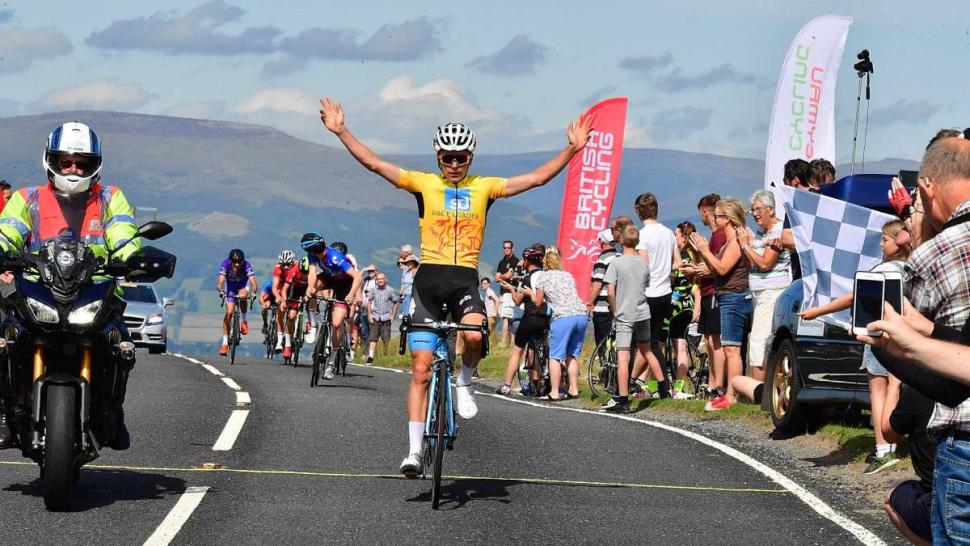
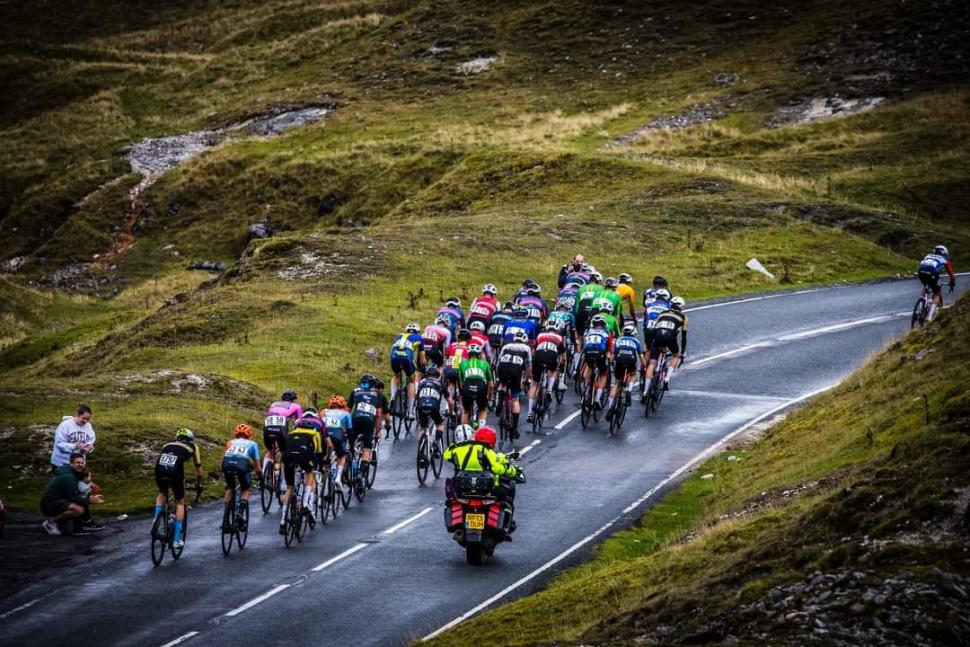
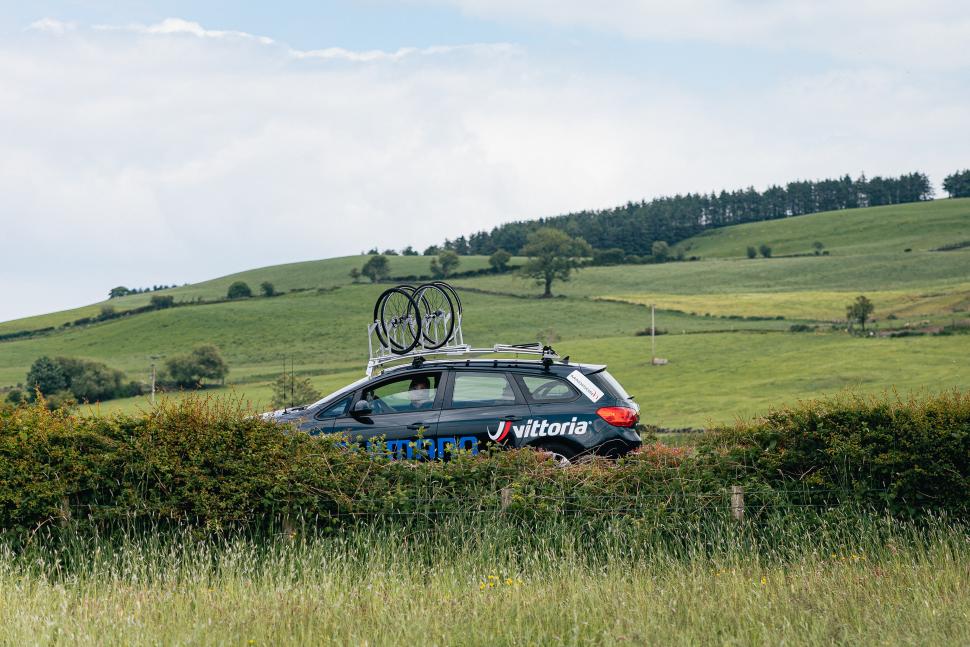
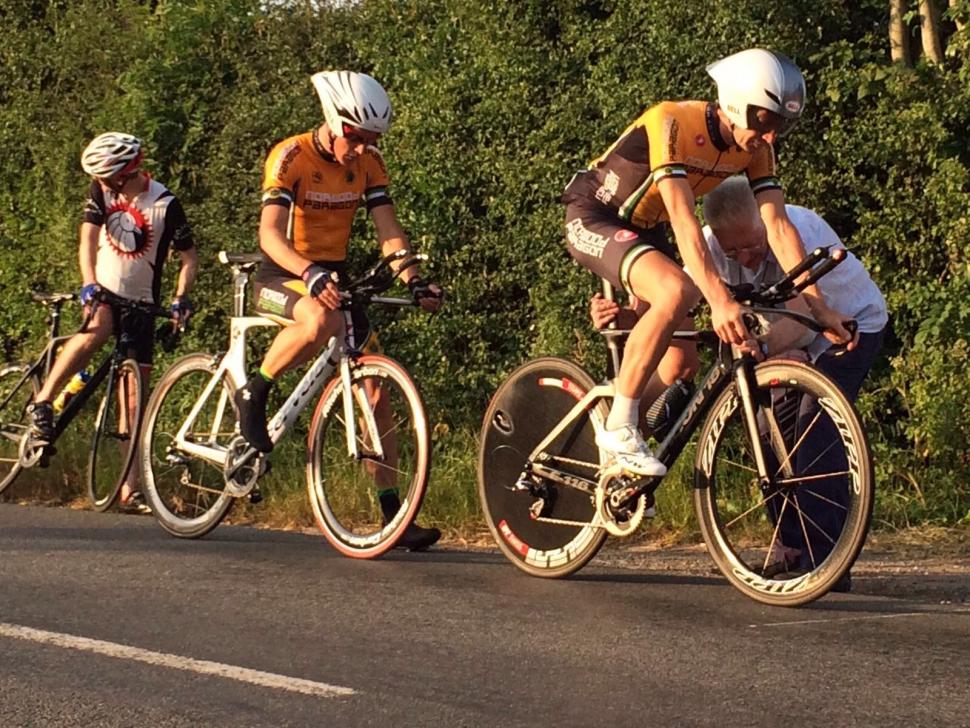
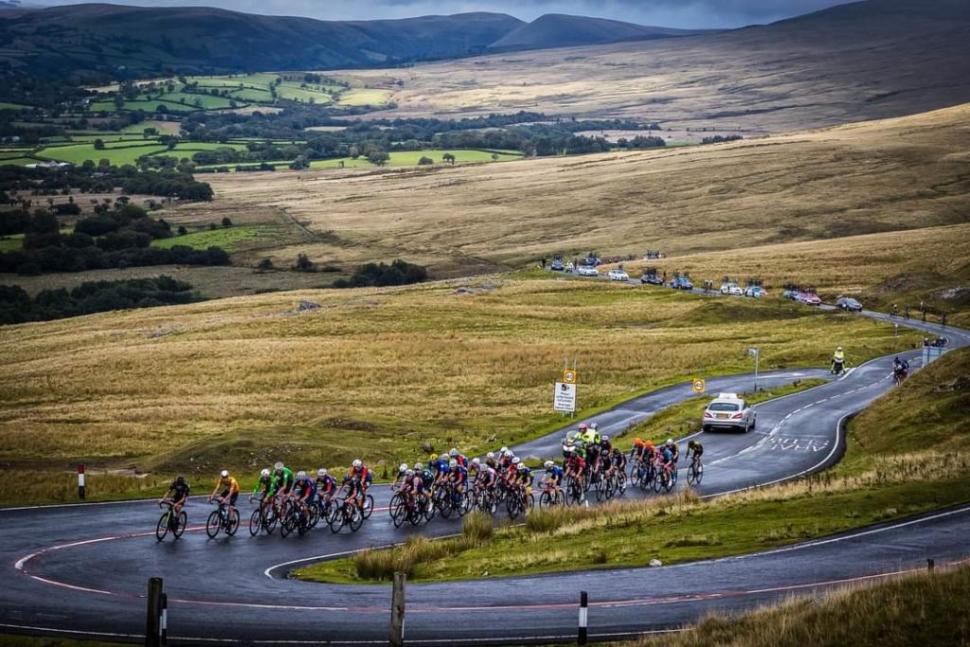
Add new comment
29 comments
Honestly, even some of the most hardened advocates of 20mph speed limits must surely question the inclusion of certain roads in Wales. The implementation has been marked by a significant lack of uniformity, as some councils have exempted roads contrary to the guidelines, while others have included roads that should be exempt. The guidelines also state that "exceptions cannot be based on existing traffic speeds", as if no one had previously considered this when setting speed limits.
Some of the roads included seem to have been selected with the intention of undermining the speed limits. Additionally, there is the issue of not being able to use repeaters, so the 20-limit is determined by the absence of signs, which is inconsistent with how it is handled elsewhere in the UK.
To me the attitude of the race organisers in Wales still seems rather overwrought.
The law includes provision for exceptions, so since their route is presumably not through the backstreets of quiet housing estates very much they could be asking for the 7 miles they need to be reverted to 30mph.
We are in the middle of a partial (imo not very much) roll back process, so I think that should be possible.
Ot if it's only 2-3% of the race length, those sections can be set at 20mph with a pace car or nullified.
Not necessarily practical - if the race is fragmented, you could have more bunches than pace cars available.
They would need a suspension of the RTA, which can be a pain in the backside, and can't usually be done quickly. A reason why, apart from a couple of events, we never saw closed roads motorsport on the UK mainland.....closing the road is fairly easy, but suspending the Road Traffic Act wasn't. Now each event has to apply to do this; in fact, there will be an rally event in Ceredigion next weekend on closed roads.
Seems that going forward the race organisers either need to avoid the 20mph roads, or apply to suspend the RTA for a short period.
Why can't they rely on the lack of policing and enforcement? It's not like other drivers don't speed every single day.
Speed limits aiui still do not apply to cycles.
No, but they do apply to the support vehicles. That's the real issue.
"the late registration of the Junior Tour gave little space to properly investigate alternative routes"
That's all we need to know about this.
Meanwhile the BBC is running its culture wars thing trying to pin the blame on 20 mph zones.
I live in Wales and I have not spoken to any cyclist, whether members of a club or not who are against the 20mph introduction on Welsh roads.
Quite the opposite and in fact the general population is the same in my experience. Ask anyone who's road where they live has changed to 20mph, if they want it changed back to 30mph and the answer is likely to be resounding no.
The more we move away in time from the culture wars whipped up by the Tories in a desperate attempt to attract votes, the less we will see and hear of the crazies, who seem to be against anything that makes our communities a more pleasurable and safe place to live.
It is almost a years since the 20mph in built up areas was introduced and people are realising that the negative propoganda they were fed at the start was just nonsense and fear mongering
If you race on open public roads then the relevent laws will apply, I fail to see why this is such a shock to some people.
Not everyone is a Tory, and I usually find their rationale for opposing the speed limits to be quite superficial and ill-informed. Their arguments often focus on the increased time it takes to drive longer distances, while my counterpoints emphasize that actual speeds don’t decrease significantly. I also discuss engineering recommendations and the 85th percentile speed, which provide a more comprehensive basis for evaluating speed limits.
Two stories this week about racing on Open Roads, both covered by the BBC.
1) Richmond park Duathlon.
2) Junior Tour of Wales.
“Once is happenstance. Twice is coincidence. Three times is enemy action” - Ian Flemming - Goldfinger.
Seriously, is there a problem with racing (Both TTs and Road Racing) on open roads? I think if there was a referendum or a parliamentary debate we would be in trouble.
The comments under the BBC article on this story are the typical sort of stuff you get on local newspaper web sites: complaints about lycra louts and red light jumping. Utterly irrelevant to speed limits being applied to support cars in a race that happens to involve cyclists. The BBC moderators are normally very strict about removing off-topic comments, or generalising about a minority, but they've made no attempt to do so for this story. That's because they don't really care about how on-topic or offensive you are, they just have a list of forbidden topics (e.g. the monarchy) and another list of allowed punch bags (e.g. cyclists.)
My point exactly - I'm not sure if the two lists actually exist, but the general internal viewpoints certainly do.
I noticed that one of the comments on there actually asked the bbc why they had opened up the article to comments, when they knew what sort of comments they'd get.
I'd wager that they opened it up to comments precisely because they knew what sort of comments they'd get...
Exactly. Classic Gammon rage bait.
If there are "only seven miles of 20mph across the whole 237-mile, four-day race, and even then split into a number of very short sections" why can't either the cars for those "very short sections" accept they will briefly fall slightly behind or a neutralisation to 20mph be applied - commissaires etc all slow to 20mph and anyone who overtakes is DQd?
Sounds reasonable (they essentially do it on road transfer sections of car rallies, where competitors must obey road laws), but I think the issue here would be the lack of enough official vehicles to 'police' the entire field if it were strung out, as this is obviously not on the scale of a Grand Tour or other major pro race.
That is a problem obviously, but they could make a Strava segment for each compulsory 20mph section and mandate that every rider uploads their stage data to the app, anyone who exceeds 20mph on those segments to be penalised.
Are they not using rolling road closures where normal traffic rules including speed limits do not apply?
In the forum thread on this story I started this morning, it was explained that there are no rolling closures - they are racing on open roads.
I have just been told that racing on open roads is the norm in UK and has been for decades. If this is true, it's insane!
Yes, hence the need for the motorised race convey, to create a secure "bubble" for the riders.
That's insane!
Surely what's insane is the authorities letting these scorchers *race* on public roads, for (checks article) 7 miles of which they may be going faster than law-abiding motorists? Where is the outrage at the risk these silent assassins pose to everyday folks going about their business - the children, the old people, those with disabilities etc? We pay our road tax to be able to use the roads for transport, not to be disrupted by extreme sports (continues...)
Presumably this all came about because road racing started informally and by and large cycle racing without full formal road closure caused little disruption and few KSIs, and the cycle organisations were very happy to work with the authorities and pay for the costs of keeping things safe for participants?
I assume that this is an attempt at humour.
Channeling.
How entitled and tone deaf these fuckers are!
They almost sound like motorists.....
If you look at the pictures you can see like many of the bigger road races, they are and that is exactly what the issue is!
Surely this has fuck all to do with 20MPH limits and more to do with racing on open roads!